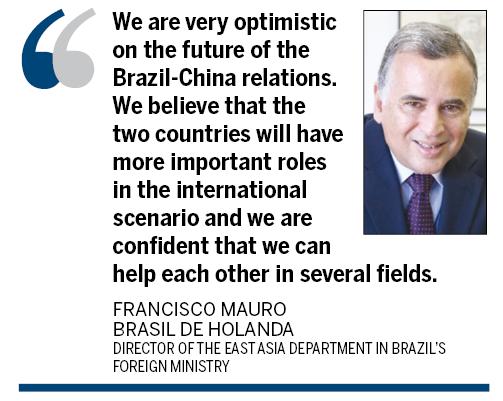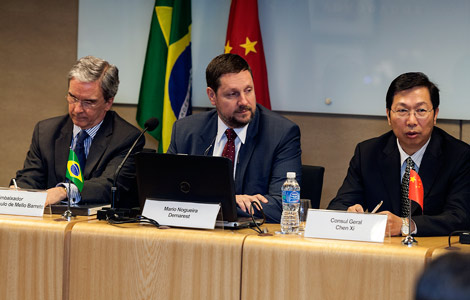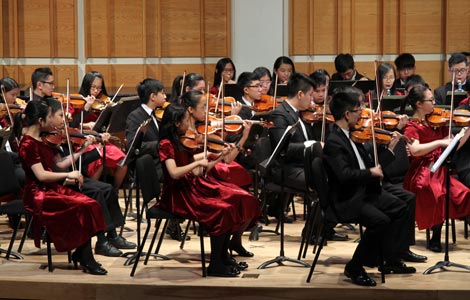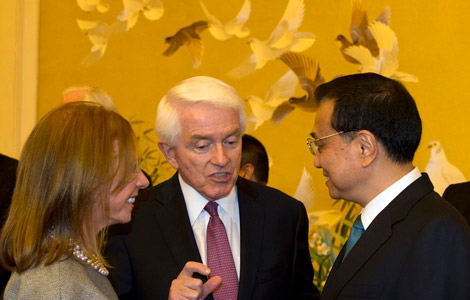China-Brazil talks 'a new chapter' in relations
Updated: 2014-07-14 09:38
By EDGARDO LOGUERCIO and BRUNA GAMA in Brasilia (China Daily USA)
|
||||||||
The Brazilian government is very optimistic on the future of their relations with China and hopes to achieve new advances in the relations at the next bilateral meeting between Brazilian President Dilma Rousseff and Chinese President Xi Jinping, which will take place on July 17 in Brazil's capital city Brasilia, says a high-ranking Brazilian diplomat.
Ambassador Francisco Mauro Brasil de Holanda, director of the East Asia department in Brazil's Foreign Ministry, highlighted the many common goals of Brazil and China, which include fields such as economic relations, cooperation on science and technology and political coordination on the global stage.

According to Holanda, the Brazilian government is very satisfied with the upcoming meeting, which will also commemorate the 40th anniversary of the establishment of bilateral relations between Brazil and China.
"It has been a period of very significant achievements,"he said. "Brazil and China became more important to each other and were called to play a broader role in the great international matters. There were advances in quantity and quality in the bilateral agenda.
"When one follows the path Brazil and China took from 1974 to now, one can see not only that they became more important to each other, but that both became more important to the world,"Holanda added.
The ambassador stressed the need to reform global governance institutions in order to adapt to contemporary times, which are much different from the post-WWII reality they reflect.
"The reality of that moment was much different than the reality of today. Since the 2008 crisis, the relative weight of the countries shifted, the developed economies got into a recession and the emerging economies, especially China, went through a growth process,"he said.
To Holanda, there is an incompatibility between the 1945 order and the current one, as several mechanisms known as "variable geometry mechanisms”, which are gathered from a conjunction of interests, have appeared since then.
One of those mechanisms is BRICS — the bloc which unites Brazil, Russia, India, China and South Africa, all large emerging economies. BRICS will hold its sixth summit next week in Fortaleza, northeastern Brazil.
"BRICS is an example of this new global geometry. Brazil and China are also present at the Finance G20, which made G8 obsolete, and in BASIC (Brazil, South Africa, India and China), which keeps a coordinated approach on the environmental front,"Holanda said.
The BRICS presidents are expected to announce the creation of a new development bank for the group, and to sign an agreement establishing the bank's reserves with resources from the five countries. The details on that matter, as well as the future location of the bank's headquarters, are still being discussed.
"The bank will make available resources for investments and foreign trade financing. The most important aspect is that it is an additional instrument for the countries in the group to expand their businesses,"the ambassador explained.
On the bilateral front, Brazil and China held a ministry meeting last April, the first since the two countries decided to elevate their relations to the level of a Global Strategic Alliance, in 2012.
The new status acknowledges the "growing dimension and importance of the multilateral aspect of the relations between the two countries"and establishes that the foreign ministries of both countries will hold annual meetings, to take place in both capital cities, in an alternating manner.
Ambassador Holanda also highlighted Brazil's ambition to have a permanent seat on the United Nations Security Council, which is a theme Brazil wants to include in their conversation with China.
The ambassador stressed that Brazil has played an important role in UN peacekeeping missions and has developed social inclusion policies which are regarded as good examples.
Brazil, he said, has 17,000 kilometers of borders with 10 neighboring countries and has never resorted to weapons to solve border issues. In addition, the country has a nonviolent stance on nuclear power: under the Brazilian constitution, nuclear energy can only be used for peaceful purposes.
"Brazil has a series of qualities which support this aspiration of a permanent seat on the UNSC,"he said.
Brazil hopes to tackle several other matters during President Xi's state visit, Holanda said, such as boosting cooperation in science and technology. Brazil and China already have a partnership on satellites, the CBERS program, and are expected to announce the launch of the fifth satellite in the program.
In addition, the country expects to close a deal for the sale of 40 Embraer jets to China, as well as reestablish the meat trade, interrupted in 2012 because of a case of mad cow disease and increase the number of companies allowed to export pork, cow meat and chicken to China.
China has been Brazil's largest trade partner since 2009, and Brazil is China's eighth largest partner. According to Holanda, the trade between the two countries has reached "extraordinary"levels, but Brazil hopes there can also be a quality boost in that commerce.
Some 80 percent of Brazil's exports to China are primary products such as food and oil, while most of China's exports to Brazil and manufactured goods. Though having a majority of commodities exports is not a problem, Brazil would like to increase the exports of other goods as well, he said.
Holanda said the meetings between presidents Rousseff and Xi represent a new chapter in broader and more diverse bilateral relations.
"We are very optimistic on the future of the Brazil-China relations. We believe that the two countries will have more important roles in the international scenario and we are confident that we can help each other in several fields,"the Brazilian diplomat said.

 Brazil launches China desk to handle economic ties with China
Brazil launches China desk to handle economic ties with China
 NY Wheel reels in Chinese EB-5 investors
NY Wheel reels in Chinese EB-5 investors
 The Penguins of Madagascar to enter China
The Penguins of Madagascar to enter China
 Panda cub Bao Bao turns one
Panda cub Bao Bao turns one
 HK kid's symphony returns to NY
HK kid's symphony returns to NY
 China, US reach agreement
China, US reach agreement
 40 bodies from jet returned to Dutch soil
40 bodies from jet returned to Dutch soil
 Dance troupe's fusion performance wins over judges
Dance troupe's fusion performance wins over judges
Most Viewed
Editor's Picks

|

|

|

|

|

|
Today's Top News
Manufacturing hits an 18-month high
Transformers producers hit with breach of contract suit
US chipmaker to be deemed monopoly
Chinese still seek Beckel termination
One dead in shooting in Philadelphia
France: Air Algerie plane 'probably' crashed
TransAsia crash while landing in Taiwan
China, UC-Davis set up food safety center
US Weekly

|

|






